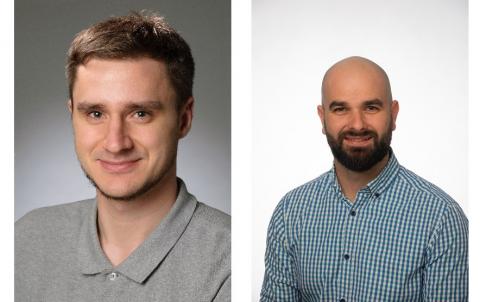
Two University of Dundee scientists have each been awarded fellowships worth £1.87 million in recognition of their outstanding research and potential to become leaders in their field.
Dr Maxim Igaev and Dr Peter Cossar, from the School of Life Sciences, received prestigious University Research Fellowships from the UK’s Royal Society. The programme aims to support the next generation of scientific leaders to build an independent research career at a UK university or research institution by funding their work for up to eight years.
Dr Igaev is a Principal Investigator within the Division of Computational Biology. His research explores how tiny molecular machines called kinetochores provide a secure ‘grip’ on chromosomes to ensure that these are correctly split when cells divide. The funding will allow him to create detailed mechanical models of these interactions with unprecedented resolution in space and time.
“The fellowship will enable me to build a strong team of scientists that bridges biology and physics to address the complex biological question of chromosome segregation in cell division from a fresh, cross-disciplinary perspective,” he said.
“My research will inform and potentially direct future biomedical studies, particularly in areas related to cell growth and cancer.”
Dr Cossar is a Principal Investigator at the Centre for Targeted Protein Degradation (CeTPD). His research focuses on developing chemical tools to tackle key questions in molecular biophysics and chemical biology.
“Targeting certain proteins involved in diseases like cancer and Alzheimer's has been a major challenge for scientists,” he said. “Most current medicines work by binding to proteins that have a fixed shape, but not all proteins have a fixed structure. Because of their flexibility, it’s difficult for drugs to attach to them.
“This fellowship will allow me to develop new ways to find and design molecular glues that could target these hard-to-treat proteins. The project seeks to identify potential drugs faster and more accurately.”
The fellowships offer researchers the freedom, time, and flexible support to pursue innovative lines of scientific research. It also enables them to develop as leaders by offering tailored professional development, networking and engagement opportunities.
More information about the University Research Fellowships scheme can be found by visiting the Royal Society website.